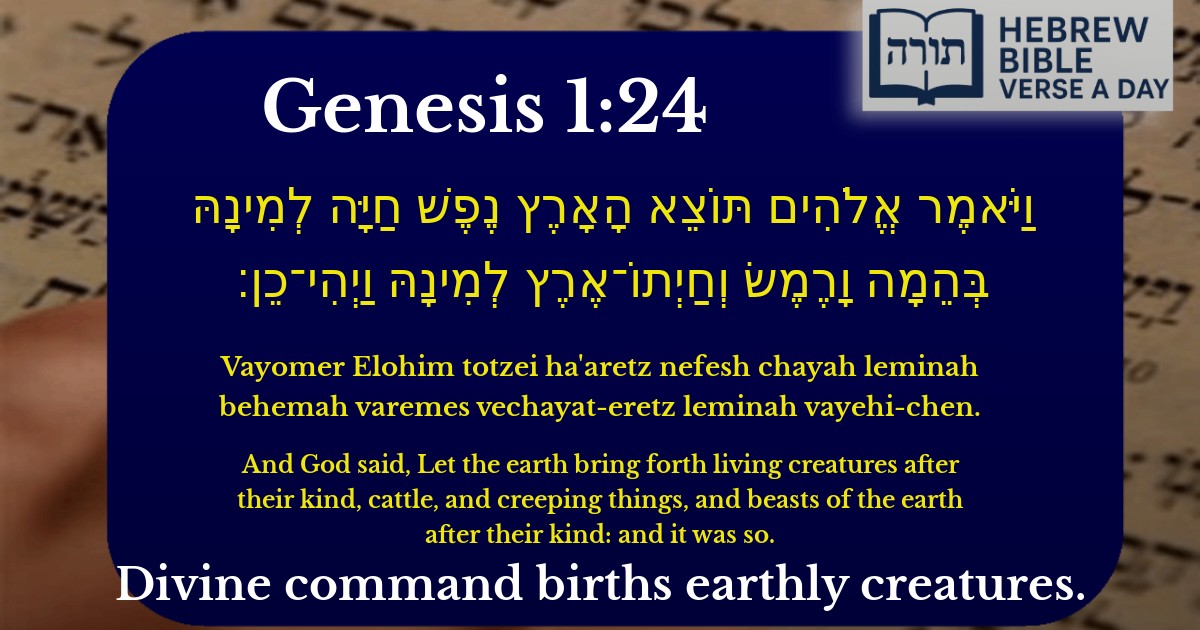Frequently Asked Questions
Q: What does Genesis 1:24 mean when it says 'living creatures after their kind'?
A: The verse teaches that Hashem created all animals with distinct species ('after their kind'). Rashi explains that this means each creature was created with its own unique characteristics and cannot transform into another species. This highlights the Divine wisdom in creation, where everything has its proper place and purpose.
Q: Why does the Torah specify three categories of animals (cattle, creeping things, beasts of the earth)?
A: The Midrash (Bereishit Rabbah) explains that these categories represent different levels of movement and habitat. 'Cattle' (בְּהֵמָה) refers to domesticated animals, 'creeping things' (רֶמֶשׂ) to small creatures that crawl, and 'beasts of the earth' (חַיְתוֹ־אֶרֶץ) to wild animals. This teaches us about the diversity and order in Hashem's creation.
Q: What lesson can we learn from Genesis 1:24 today?
A: The Rambam (Guide for the Perplexed) teaches that recognizing the precise design of each species leads us to appreciate Hashem's wisdom. Today, this reminds us to respect all creatures and their roles in the world, as each was intentionally created 'after its kind' for a purpose.
Q: How does 'and it was so' (וַיְהִי־כֵן) relate to the rest of the verse?
A: Rashi notes that this phrase appears throughout Creation to show that everything came into existence exactly as Hashem commanded—without delay or alteration. Here, it emphasizes that the earth produced these creatures perfectly according to the Divine plan.
Q: Why does the verse say the earth should 'bring forth' the animals instead of Hashem creating them directly?
A: The Talmud (Chullin 60a) explains that the earth was given a role in forming these creatures to show that creation involves partnership. Just as the earth obeyed Hashem’s command, we too must actively participate in fulfilling our purpose in the world.


The Creation of Living Creatures
The verse (Bereishit 1:24) describes the creation of living creatures from the earth, emphasizing their division into distinct categories: בְּהֵמָה (domesticated animals), רֶמֶשׂ (creeping things), and חַיְתוֹ־אֶרֶץ (wild beasts). Rashi explains that the term נֶפֶשׁ חַיָּה ("living soul") refers to creatures possessing vitality and movement, distinguishing them from plant life, which lacks autonomous motion.
Distinction Between Categories
Divine Precision in Creation
The phrase לְמִינָהּ ("after their kind") appears twice, underscoring that each species was created with its own unique characteristics. The Sforno explains that this repetition teaches that even within broad categories, subcategories exist, ensuring biodiversity and ecological balance.
The Earth as an Active Participant
Unlike earlier creations where God directly formed life (e.g., Adam), here the earth (הָאָרֶץ) is commanded to תּוֹצֵא ("bring forth") creatures. The Talmud (Chullin 60a) derives from this that the earth had a role in shaping their forms, though their souls were divinely implanted.
Fulfillment of Divine Will
The concluding phrase וַיְהִי־כֵן ("and it was so") signifies the immediate and perfect execution of God’s command. The Malbim highlights this as a recurring theme in Creation, demonstrating the seamless harmony between divine intention and natural order.